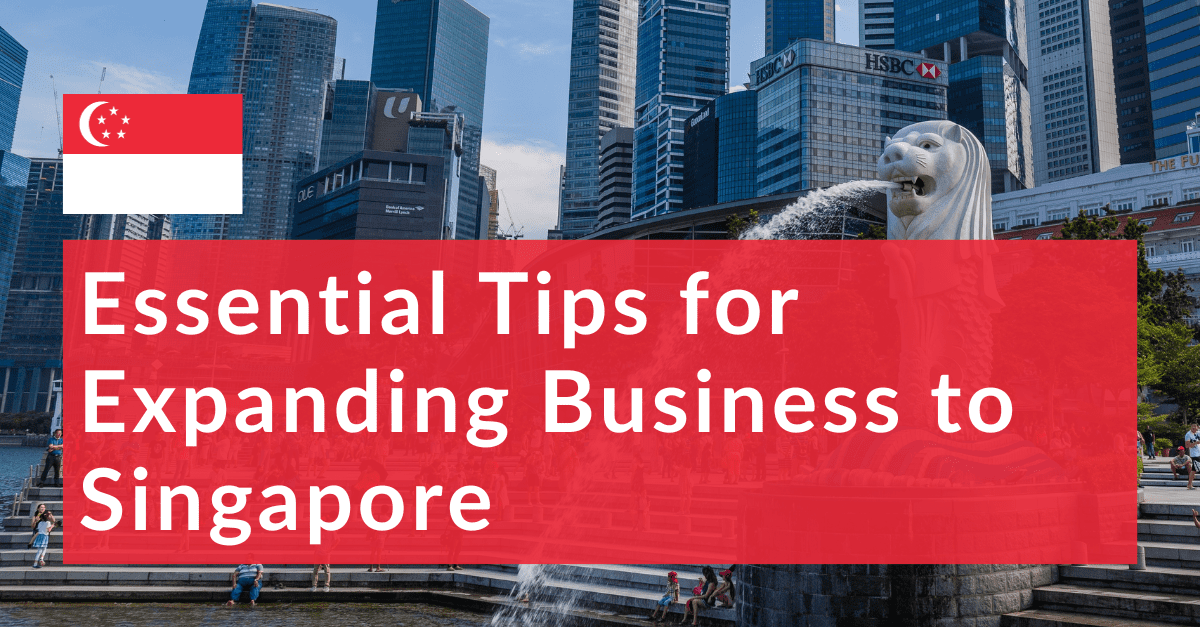Table of Contents
ToggleExpanding Business to Singapore: Essential Tips for Success
Are you considering expanding your business to Singapore? With a thriving economy, favorable tax conditions, and openness to foreign ownership, Singapore has become an attractive destination for global businesses. In this blog post, we will take a closer look at the benefits of expanding your business to Singapore and the challenges you may face while doing so.
We’ll also provide tips and advice on how to build your international team in Singapore and prepare for the cultural shift that comes with it. Lastly, we will discuss how an Employer of Record (EOR) company can help streamline your expansion process in Singapore.
Understanding Singapore’s Business Environment
Singapore’s business environment offers numerous advantages for expanding businesses. The country has favorable tax conditions and is open to foreign ownership, allowing foreigners to hold 100% of the shares in a Singapore-incorporated business.
In addition, Singapore provides access to a skilled and educated workforce, thanks to its strong emphasis on education and training. Its strategic location in Asia also offers easy market access to other countries in the region. Moreover, Singapore boasts minimal corruption and reliable governance, making it an ideal location for business expansion.
Incorporating and registering a business in Singapore is a straightforward process. One of the key benefits of relocating your business to Singapore is the absence of a capital gains tax. This means that businesses can sell their capital assets or investments without having to pay taxes on the proceeds.
A thriving economy
With its strategic location and connectivity, Singapore serves as an ideal hub for businesses looking to expand their operations. The country’s thriving economy not only acts as a gateway to the Asia Pacific region but also offers a skilled workforce and favorable tax rates.
Ranked highly by the World Bank for ease of doing business, Singapore provides a diverse business environment with key sectors including services, manufacturing, and finance. Its robust economy, coupled with reliable governance and minimal corruption, makes it an attractive destination for both startups and multinational companies.
Favorable tax conditions
Singapore offers a flat corporate tax rate of 17% and provides exemptions for certain types of income, making it an attractive destination for businesses. The country also has a low personal income tax rate, ranging from 0% to a maximum of 22%, which benefits both businesses and individuals. Singapore’s tax system is transparent and compliant with international standards, and it offers tax incentives for specific industries and foreign companies.
Additionally, the country’s numerous trade agreements provide businesses with access to global markets. These favorable tax conditions, including the highest tax bracket for individuals earning over $320,000 annually, contribute to Singapore’s reputation as a business-friendly environment.
Openness to foreign ownership
The country welcomes foreign investment and allows full foreign ownership in most sectors. Additionally, Singapore has a subsidiary-based entity structure that encourages foreign companies to establish a presence. This creates a favorable environment for international businesses looking to expand. Singaporeans have a positive attitude towards foreign businesses, further contributing to the welcoming atmosphere. Moreover, the government offers support to foreign companies through grants and incentives.
Singapore’s corporate regulatory authority ensures compliance with regulations and protects the interests of investors. In Singapore, however, 100 percent of an incorporated company may remain in foreign hands. This allowance makes Singapore an attractive expansion destination for many international companies because they may retain full ownership and control of their new branches.
Benefits of Expanding Your Business to Singapore
Expanding your business to Singapore offers a multitude of benefits, including access to a skilled and educated workforce, a stable and transparent business environment, easy market access to Asian markets, and the opportunity to take advantage of free trade agreements.
However, ever-tightening international labor quotas cause difficulties for businesses working in Singapore. These strict limits related to political issues sometimes result in labor shortages and challenges for companies that need to recruit a large number of qualified employees. Moreover, the Economic Development Board (EDB) provides crucial support and guidance to businesses in Singapore, helping them thrive.
Access to a skilled and educated workforce
Singapore boasts a highly skilled and educated workforce that prioritizes innovation and technology. The country’s education system places a strong emphasis on STEM subjects and vocational training. Singaporeans are known for their professionalism and strong work ethic.
To maintain a continuous supply of skilled workers, the government invests in workforce development programs. Additionally, Singapore offers work visa schemes to attract foreign talent and address skill gaps. With these key advantages, businesses expanding to Singapore can tap into a talented pool of professionals to drive growth and success.
Minimal corruption and reliable governance
Singapore’s strong reputation for minimal corruption and transparent legal system has made it a preferred destination for business expansion. The country consistently ranks high in global corruption indices, thanks to the government’s zero-tolerance policy towards corruption and its efficient judicial system that enforces anti-corruption laws.
This creates a trustworthy and reliable business environment, where investors can conduct business without fear of bureaucratic malaise. Singapore’s regulatory authorities, such as the Inland Revenue Authority and Corporate Regulatory Authority, ensure compliance with regulations, fostering a fair and transparent market. Additionally, the Ministry of Environment enforces strict environmental standards, promoting sustainable business practices. These factors make Singapore an attractive choice for businesses seeking a reliable and corruption-free operating environment.
Strategic location offering easy market access
With its strategic location in Southeast Asia, Singapore serves as a gateway to major Asian markets. The country’s well-developed infrastructure and connectivity make it a regional transportation and logistics hub. Singapore’s port, one of the busiest in the world, facilitates international trade. Around 36 million shipping containers pass through Singapore’s port each year, making it one of the busiest in the world.
The Land Transport Authority ensures efficient land transport systems for businesses. Supported by advanced technology and efficient processes, Singapore’s shipping and logistics industry thrives. This strategic location and easy access to markets contribute to Singapore’s economy and attract multinational companies looking for a foothold in Asia.
What are the steps to efficiently build your international team in Singapore?
To efficiently build your international team in Singapore, start by developing a tailored recruitment strategy. Leverage online platforms and job portals to attract both local and international talent. Ensure compliance with workplace safety regulations and establish clear communication channels. Provide cultural training and support for international employees.
Strategies for recruiting local talent
To effectively recruit local talent in Singapore, it is important to develop partnerships with local educational institutions and professional organizations. Networking on social media and leveraging online platforms can also help connect with potential candidates. Offering competitive compensation packages and opportunities for career growth, including streamlined payroll processes, will attract top talent.
Showing a commitment to diversity and inclusion in the workplace will further enhance your company’s appeal. Engaging with recruitment agencies that specialize in the Singapore job market can provide access to a wider pool of qualified candidates. By implementing these strategies, your business can successfully recruit the best local talent in Singapore.
Understanding and leveraging government incentives
To successfully expand your business to Singapore, it is crucial to understand and leverage the various government incentives available, such as the support provided by the Singapore government. Familiarize yourself with government grants and funding schemes designed to support businesses in Singapore.
Additionally, explore tax incentives and exemptions specifically targeted towards foreign companies. Collaborating with the Economic Development Board (EDB) can provide access to valuable resources and support. Stay updated on changes in government policies and initiatives to take advantage of new opportunities.
Lastly, engage with industry-specific associations to tap into sector-specific incentives, including the compliance with the Common Reporting Standards (CRS). By leveraging these government incentives, including the support provided by the Singapore government, you can maximize your business’s growth and success in Singapore.
Preparing for the Cultural Shift when Expanding to Singapore
When expanding your business to Singapore, it’s crucial to prepare for the cultural shift. Understanding and respecting cultural differences in business practices is essential. In addition, adapting your communication style to suit the local work culture can help foster positive relationships.
Embracing diversity and creating an inclusive work environment will not only enhance employee morale but also harness the strengths of the multicultural workforce in Singapore. Stay open-minded and willing to learn from the local culture, as this can lead to valuable insights and opportunities for innovation and collaboration.
Navigating cultural differences in business practices
When expanding your business to Singapore, it is essential to navigate the cultural differences in business practices. Familiarize yourself with Singapore’s cultural norms and etiquette to ensure smooth interactions. Building relationships through networking events and social activities is crucial in the Singaporean business landscape. Emphasize long-term relationships and trust-building when conducting business dealings.
Be aware of hierarchical structures and decision-making processes within Singaporean organizations. Seek guidance from local advisors or mentors who can provide insights into navigating cultural nuances. Understanding and respecting these cultural differences will greatly contribute to your business success in Singapore.
Adapting to the lifestyle and work culture in Singapore.
Adapting to the lifestyle and work culture in Singapore is essential for successfully expanding your business. Understanding Singapore’s business culture and etiquette is crucial to building strong partnerships with local businesses. It is also important to adapt to the work-life balance and work schedule in Singapore, which emphasizes productivity and efficiency.
Navigating the legal and regulatory requirements for setting up a business in Singapore is necessary to ensure compliance. Additionally, learning the local language and customs can help improve communication with clients and colleagues. By embracing the unique aspects of Singapore’s lifestyle and work culture, you can thrive in this dynamic market.
How can an EOR company help your expansion in Singapore
An EOR company such as Eos can be a valuable resource for businesses looking to expand in Singapore. By leveraging the services of an EOR company, you can establish a presence in Singapore quickly and efficiently. We can handle legal and compliance matters, allowing you to focus on your core business operations.
With our expertise, Eos can help you navigate Singapore’s complex business environment, ensuring that you comply with employment regulations and hire local talent seamlessly. Additionally, we offer flexibility, enabling you to scale up or down as needed. Our support can be instrumental in successfully expanding your business in Singapore.
Frequently Asked Questions
How easy is it to obtain a work visa for employees in Singapore?
Obtaining work visas for employees in Singapore is a relatively straightforward process. Employers must apply for permits and visas on behalf of their employees, providing proof of qualifications, experience, and a clean criminal record. It’s advisable to seek guidance from an immigration lawyer or consultant.
Are taxes in Singapore harsh for businesses?
Singapore’s business-friendly tax system makes it an attractive destination for businesses. With a relatively low corporate tax rate ranging from 0% to 17%, coupled with incentives like the Productivity and Innovation Credit scheme, Singapore offers favorable conditions for businesses. Consulting with a tax advisor or accountant, and taking advantage of the incentives provided by the Inland Revenue Authority of Singapore, is essential for compliance with local tax laws.
What are the compliance requirements for foreign companies with a branch or subsidiary in Singapore?
To expand your business to Singapore, foreign companies with a branch or subsidiary must meet compliance requirements. This includes registering with ACRA, appointing a resident director, maintaining proper accounting records, and filing annual returns with ACRA and IRAS. Compliance may vary by industry, so professional guidance is advised.
Conclusion
Expanding your business to Singapore can be a game-changer for your company’s growth and success. Singapore’s thriving economy, favorable tax conditions, and openness to foreign ownership make it an attractive destination for business expansion. By expanding to Singapore, you gain access to a skilled and educated workforce, minimal corruption, and reliable governance.
However, there are challenges and considerations to keep in mind, such as incorporating and registering your business, obtaining necessary permits and accounts, ensuring regulatory compliance, and competing in a dynamic market. Overcoming potential labor shortages and preparing for the cultural shift are also crucial steps in the expansion process.
To efficiently build your international team in Singapore, consider strategies for recruiting local talent and understanding and leveraging government incentives. Additionally, navigating cultural differences in business practices and adapting to the lifestyle and work culture in Singapore are essential for a successful transition.
If you need assistance with your expansion in Singapore, consider partnering with Eos. We can provide valuable support and guidance throughout the expansion process. We are running a promotion until 31st December 2023 for you to onboard your staff in Singapore for as little as $280/month. Enjoy free consultation, flexible benefits, and Employment Pass (EP) sponsorship for foreign talent. Get in touch with us today to explore how we can help you make your business expansion a seamless and successful experience.







